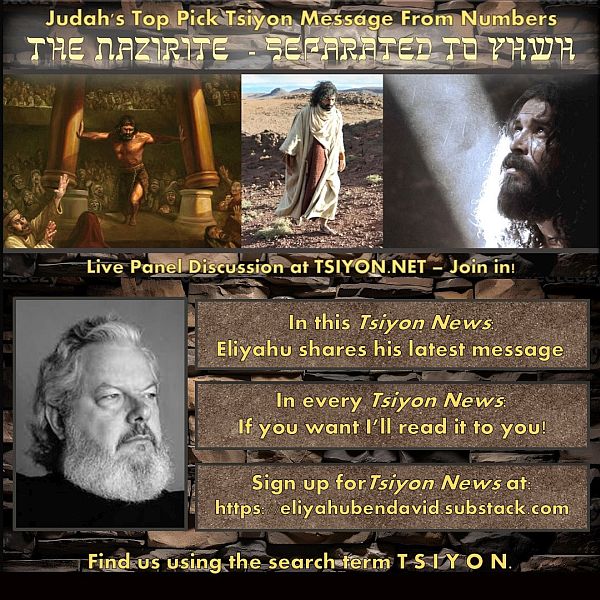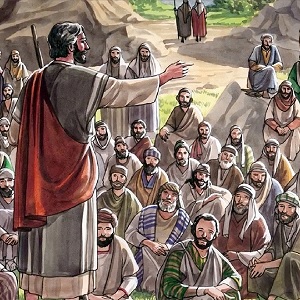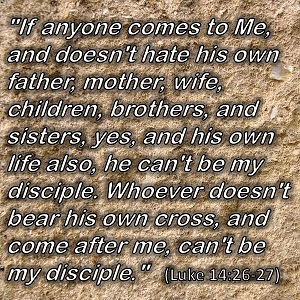Tsiyon Messianic Radio Newsletter - Vol 19.10 - 12/28/6023
TAM - 03/09/2024 AD
|
|
 |

|
|
From Eliyahu |
|
|
|
|
|
I've been told I sometimes
gravitate toward uncomfortable concepts from Scripture that aren't very
popular, even if true. Guilty as charged, and here's why: The truth is why.
To illuminate the whole Word of truth you can't leave out any of it. If you
leave out some of it, for whatever reason, you have just distorted all of
it. That being true, my intention is to bring light into the areas that
don't get taught on, or discussed very much, so as to teach the whole Word
of truth. Very often the parts that don't get taught on are also the very
same parts that can be uncomfortable or unpopular or both. Therefore, I must
teach it all, even the parts many people don't want to hear. To do otherwise
would be to deny my calling, and to be unworthy of my Lord.
While I see myself as a
positive person, I don't think anyone has ever been saved by the power of
positive thinking. Indeed, positive thinking is not the answer to sin, and
I'm pretty sure that every human, no matter how positive their thinking may
be, must die eventually. Indeed, positive thinking falls far short of other
virtues such as, love, faith, truth, and more especially the hard ones like
self-sacrifice, humility, and self-control. Yet, the positive
thinking, go along to get along gospel, seems to be the gospel that attracts
the most people. It is always upbeat and accepting of just about anyone, no
matter what they do or who they do it to. It is the "feel good" gospel. This
approach may fill up mega-churches but is not the Gospel of Scripture, since
it falls far short of teaching the whole Word of God, and even contradicts
it.
If a person is confronted with
the whole Word of truth, that person must get into uncomfortable
territory at times, for the simple reason that the Scriptures mean to push
people beyond their comfort-zone. The object of this process is to challenge
each of us to grow into the holy person we are meant to become in Messiah.
That means radical transformation of ones self as Scripture commands:
"Don't be conformed to
this world, but be transformed by the renewing of your mind, so that you
may prove what is the good, well-pleasing, and perfect will of God." (Romans
12:2)
Messiah meant to transform
people. Making everyone feel comfortable as they were was definitely never
the goal of the Messiah. Here is an example of the sort of passage I'm
talking about:
"If anyone comes to me,
and doesn't hate his own father, mother, wife, children, brothers, and
sisters, yes, and his own life also, he can't be my disciple. Whoever
doesn't bear his own cross, and come after me, can't be my disciple."
(Luke 14:26-27)
See what I mean? Is it any
wonder this passage is almost never quoted from the pulpit? It sounds like
an absolute outrage - while of course being entirely true. This is what
Yeshua said in His bid to call people to discipleship. This is not what you
say if your goal is bringing in great numbers of people. This is what you
say to bring in only those who are willing to give their all.
The point here is that the
price you must pay to be a disciple of Messiah is nothing less than total
surrender of all you hold dear - everything. That is not an exaggeration.
Total dedication without limits is His real stated requirement to be His
disciple.
What is a disciple? Are you
one?
|
 
The word translated as
disciple means a learner. This is not a student who simply learns
in class, and from books - and then goes and does whatever he wants. When
Messiah walked among us He was publicly seen as an independent Jewish rabbi,
and He used the vocabulary of a rabbi frequently. In this connection He used
this word disciple in its standard meaning of that day, in Judea.
A disciple was a person who
dedicated himself to a rabbi in a very literal sense. He was also a follower
of his rabbi in a literal sense, walking with that rabbi constantly, to
learn how to become just like his rabbi. He dressed as his rabbi dressed,
ate how his rabbi ate, and did what his rabbi did. He received the teaching
of his rabbi and made it his own. He was also a servant of his rabbi and did
what his rabbi commanded him to do. He had no life of his own, outside of
devotion to his rabbi, and his rabbi's teaching.
In the verse above Yeshua was addressing great
multitudes who came out to see the healing and teaching He was famous for.
He used the occasion to recruit new disciples. In one sense, this is similar
to an altar call in today's churches. However, what he was offering was not
a ticket to stay out of hell, or to enter heaven.
Rather, what He was offering was a chance to
be His in a very literal way. To walk with Him as he traveled from place to
place. To eat what He ate. To wear what He wore. To learn how He lived
firsthand and to hear what He taught on a personal level. To have a close
personal relationship with Him and to do as He commands. (Luke 14:25)
There would be no time for going home on
vacation, or other concessions to family, in the event that such would
interrupt the disciple from following Him. In fact, when one disciple said
to him, "Lord, allow me first to go and bury my father." Yeshua answered
"Follow me, and leave the dead to bury their own dead." (Matthew 8:21-22)
Discipleship is about priorities. Yeshua knew
He had a very short time to fulfill His ministry on earth with us. Doing
that work in the will of the Father was His top priority. He only wanted
disciples who could accept that same priority because, among other things,
He had no time to babysit a bunch of crybabies. Was Messiah and Messiah's
work more important even than a man's family? Yes, but the family and
friends probably wouldn't see it that way. They would likely see the
devotion to the Rabbi that was keeping the disciple from a family-oriented
focus as hatred toward them. The person considering discipleship should
first decide if they are willing to accept the opposition from family and
friends that may accompany their discipleship. Their dedication had to be
total. That is the meaning of Luke 14:26+27.
The Greek word disciple is translated
from is mathētēs (Strong's G3101) and appears only in the four
Gospels and the book of Acts a total of 268 times. That's a lot of times in
just 5 books. After the book of Acts the word is never used again.
That may be because the classic disciple model I have outlined above
eventually gave way to the congregation model and method of teaching. While
we often speak of all professing believers as disciples, that is not
technically correct. In fact, most are not disciples in the original meaning
of the word.
The good news is, true discipleship is still
possible because our Rabbi lives! Therefore, whether you are a disciple or
not is entirely a matter of your choice and your commitment level.
Prayerfully consider Luke 14:25-35, and John 14:15-27 for greater insight
into these things.
Tonight's live stream meeting and panel discussion will focus on
Judah's Top Pick Tsiyon Message from Numbers: The Nazirite - Separated to
YHWH. There is a lot more to the Nazirite than crazy hair. This
discussion will be of great value for every true disciple.
That's tonight
at 8 PM, Central Time, at Tsiyon.Net.
Be there and be blessed.
In His Name,
Eliyahu
Tsiyon.Org
PS - Tell your friends to subscribe free to
this enhanced Tsiyon News at
https://eliyahubendavid[dot]substack[dot]com/ . If you have already signed up as
a Tsiyon member at Tsiyon.Net
then you are already subscribed to Tsiyon News at substack.
Become a Torah Expert
|
|
 |
|
|
|
|
|
|
|
"This
generation will not pass away until all things are accomplished."
Luke 21:32 |
|
|
|
|
Thanks to our Tsiyon Ministry Partners for your support of this ministry!
Not a Tsiyon Ministry Partner yet? Visit our Tsiyon
Website
for full details.
|
|
|
|
|
|
|
Leave
feedback, prayer requests and comments
here.
You may unsubscribe
here.
|
|
|
Tsiyon
9901 Brodie Lane
Suite 160 PMB1421
Austin, TX, USA, 78748
Please make offering checks to: "Tsiyon."
|
 |
 |
 |
|
|
|
|
|
|
|